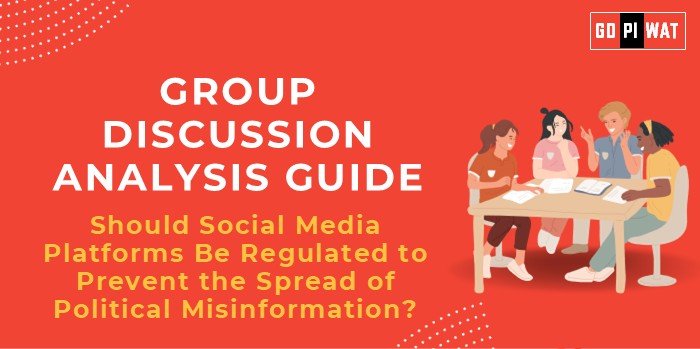📋 Group Discussion Analysis Guide
🌐 Should Social Media Platforms Be Regulated to Prevent the Spread of Political Misinformation?
🌍 Introduction to the Topic
Opening Context: Social media platforms, pivotal in modern communication, often act as the battleground for political narratives. The unchecked spread of political misinformation poses challenges to democratic processes globally.
Topic Background: Misinformation has long influenced politics, but its amplification on platforms like Facebook, Twitter, and WhatsApp since the 2016 U.S. elections has raised global concerns. Governments, civil society, and tech giants face growing pressure to address the issue.
📊 Quick Facts and Key Statistics
- 📰 Fake News Proliferation: 70% of users share news without verification (Pew Research, 2023).
- 📊 Impact on Elections: 65% of survey respondents believe misinformation influenced voting decisions in recent elections (Gallup, 2023).
- 📉 Platform Responses: Twitter flagged 3.4 million tweets for misinformation in 2022.
- 🌍 Government Actions: Over 40 nations have introduced or proposed laws targeting fake news on social media.
🔑 Stakeholders and Their Roles
- Governments: Regulate content, ensure accountability, and safeguard democratic integrity.
- Tech Companies: Develop algorithms to flag misinformation and enhance transparency.
- Citizens: Exercise media literacy and verify information.
- Civil Society Groups: Advocate for ethical online practices and counter misinformation campaigns.
🏆 Achievements and Challenges
✨ Achievements:
- AI tools like Facebook’s fact-checking flagged 80% of false content during the 2020 U.S. elections.
- Germany’s NetzDG law set benchmarks for social media regulation.
- Public awareness campaigns improved media literacy in nations like Finland.
⚠️ Challenges:
- Balancing free speech and regulation.
- Global disparity in regulation enforcement.
- Advanced AI creating hyper-realistic misinformation.
🌍 Global Comparisons and Case Studies
- Estonia’s integrated regulation model for digital governance as a success story.
- Myanmar’s failure to prevent hate speech amplification leading to violence.
- India’s IT Act amendments mandating platform compliance but raising privacy concerns.
📚 Structured Arguments for Discussion
- Supporting Stance: “Regulation of social media is essential to safeguard elections and democratic processes from misinformation campaigns.”
- Opposing Stance: “Regulating social media threatens free speech and could lead to authoritarian overreach.”
- Balanced Perspective: “While regulation is crucial, it must ensure a balance between free expression and misinformation control.”
🛠️ Effective Discussion Approaches
- Opening Approaches:
- Cite statistics on misinformation’s electoral impact.
- Highlight a high-profile misinformation incident (e.g., COVID-19 vaccine misinformation).
- Counter-Argument Handling:
- Discuss alternatives to regulation for ensuring democratic integrity.
- Highlight successful global models like Germany’s NetzDG.
📈 Strategic Analysis (SWOT)
- Strengths: Improved democratic processes, enhanced accountability.
- Weaknesses: Potential misuse of regulation, operational costs for tech companies.
- Opportunities: Collaborative global frameworks for regulation.
- Threats: Deepfake proliferation, backlash against perceived censorship.
🎓 Connecting with B-School Applications
- Real-World Applications: Link to digital marketing ethics, policy-making studies, and data privacy projects.
- Sample Interview Questions:
- “How can technology companies balance business interests with social responsibility?”
- “Should India adopt stringent misinformation laws like Germany?”
- Insights for Students:
- Explore the intersection of ethics and innovation in tech.
- Evaluate case studies on regulatory successes and failures.


